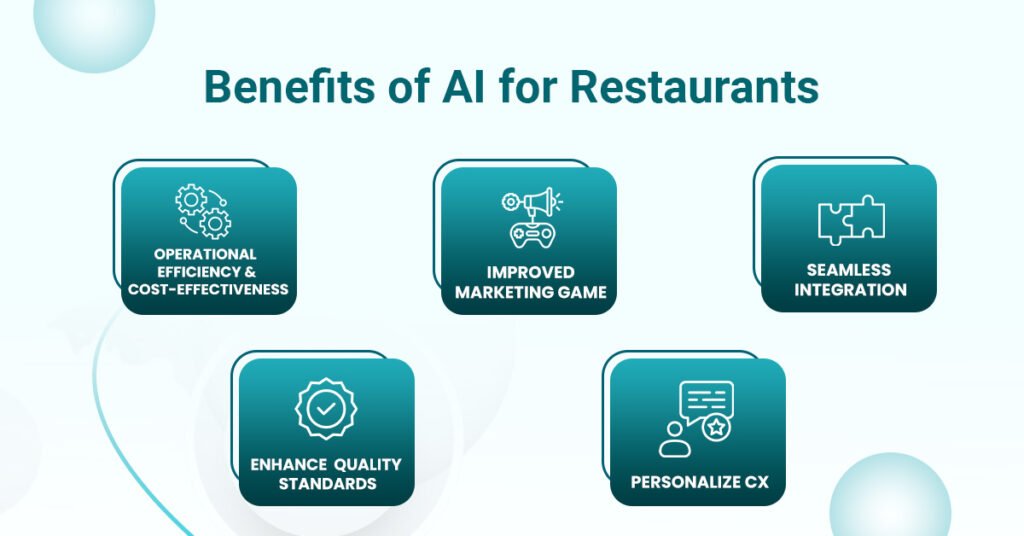2025 is here and there’s nothing in this world that AI hasn’t tapped yet, isn’t it?
But one sector that has undergone major transformation is none other than the “Restaurant Industry”!
AI is significantly paving the way to an enhanced dining experience from complete order management to customer interactions.
Well, the stats don’t lie!
- As per Business Insider, nearly 60% of restaurants with AI experienced an improvement in their overall processes.
- According to the experts, AI has the potential to cut food waste in restaurants by as much as 25%.
- The AI technology in the food & beverage industry is expected to go beyond USD 13.39 billion by the end of 2025.
Sounds interesting, doesn’t it?
But now the question arises- How to leverage full potential of AI in the restaurant industry? How does AI in the food industry enhance customer experience?
Without further ado, let’s dive in and start with the basics!
What AI is all about?
To put it simply, AI refers to artificial intelligence that mimics human actions to make decisions or provide answers to queries based on the input given. Coming to the restaurant industry, implementing AI technology can aid in streamlining efficiency, improve overall costs, and ultimately, enhance the customer experience.
But how is that even possible? Let’s get started!
It’s no secret that AI mimics human actions, thus, its working is based on capturing data from its surroundings like customers’ behaviour, their past orders, meals they frequently order, the number of times they visit a restaurant, feedback, and more. Therefore, it may help customers to explore new eateries, which may ultimately increase your restaurant’s sales.
The main purpose of AI is to enhance customer experience in restaurants. Let’s understand what it exactly does.
- Create chatbots for real-time customer interactions.
- Check on food safety and freshness.
- Handling customer queries and other service tasks
- Optimize Inventory Management.
Although the use of AI technology is in its early stages, it still has the potential to transform the way that restaurants interact with customers. With personalized recommendations, restaurants can foster an enhanced customer experience.
But now the question arises- Why? Why are restaurant businesses embracing AI tech in their operations?
Why are Restaurants Adapting to AI Technology? What are the Benefits of AI for Restaurants?

Here is a list of the reasons behind the growth of AI technology in the restaurant industry.
#1. Operational Efficiency & Cost-Effectiveness
No matter whether you own a small or a big establishment, everyone wants to cut down their upfront expenses to a minimum. Furthermore, AI technology may help keep the entire process smoother and hassle-free. When you already know what your customer will order and in what quantity, you may have better chances of serving with ample quantity without wasting. Thus, it may help save you both time and money.
#2. Enhance Quality Standards
One of the biggest reasons to invest in AI technology is that you may have an idea of the quality of the food you’re serving to your customers. The technology helps food processors to go beyond minimal expectations which ensures that everything you serve is of fresh quality and safe. When you rest assured of the fact that you’re serving the “Best”, you will have an edge over your competition.
{Also Read: Top Reasons to Invest in a Mobile App for Your Restaurant}
#3. Improved Marketing Game
Another major benefit of choosing AI technology is that it can effectively analyze customer data and find potential customers to target them effectively. From offering discounts to loyal customers to on-demand price adjustments, AI is incredibly helpful in optimizing pricing strategies. Remember that AI can thoroughly understand your customers and provide customized menu options while improving your marketing efforts.
#4. Personalize CX
Investing in AI tech can significantly enhance the customer experience by recommending menu items based on past orders, preferences, and dietary needs. Thus, it may help restaurants better meet their customers’ needs while creating personalized dining experience. Furthermore, implementing such a technology may help automate mundane tasks such as inventory management and order processing.

#5. Seamless Integration
Last but not least, AI technology is incredibly helpful for seamless integration in the restaurant business which may help them to use less energy and manage their stuff better with proper resource utilization. Thus, it simply means that businesses can work better without jeopardizing their budget, which can make things more sustainable in the long run.
What Are The Key Ways AI Is Transforming The Restaurant Industry?
Let’s take a look at the key ways in which AI is transforming the restaurant industry.
#1. Chatbots for Customer Interaction
AI-powered chatbots are transforming customer interactions in the restaurant industry. These virtual assistants are designed to engage with customers, answering their questions and providing personalized recommendations with remarkable precision. Thanks to their ability to process and understand natural language, chatbots deliver quick and accurate responses, continuously improving through machine learning. By integrating chatbots, restaurants not only enhance their customer service but also allow staff to focus on tasks that require human expertise, boosting overall operational efficiency.
#2. Recommendation Systems
AI-driven recommendation systems are reshaping how restaurants cater to individual customer preferences. By analyzing data such as past orders and customer behavior, these systems suggest personalized menu items and promotions. This level of customization enhances customer satisfaction and drives sales. Furthermore, AI helps restaurants optimize their menu offerings by identifying trending dishes and forecasting future culinary trends, ensuring a competitive edge in the market.
#3. Automated Ordering Systems
Automated ordering systems represent a significant leap forward in restaurant automation. These AI-based technologies streamline the ordering process by understanding customer preferences, presenting tailored options, and facilitating seamless transactions. The result is improved efficiency and a more personalized dining experience. As automation evolves, the industry is transitioning to a tech-savvy model that prioritizes convenience and customer-centricity, redefining how restaurants operate.
#4. Efficient Live Tracking
AI-enabled live tracking technology is revolutionizing operational efficiency in the restaurant industry. By providing real-time updates on orders and processes, this technology ensures timely and accurate service. Live tracking improves order accuracy, accelerates delivery times, and showcases a commitment to reliable and prompt service. This dynamic integration of AI and tracking capabilities elevates the overall customer experience in today’s fast-paced dining environment.
#5. Inventory Management and Demand Forecasting
AI is transforming inventory management and demand forecasting by leveraging advanced predictive analytics and machine learning. Traditional methods, which relied heavily on historical data, are being replaced with predictive approaches that incorporate external factors for greater accuracy. This innovation minimizes disruptions, reduces perishable losses, and aligns inventory levels with market trends. Restaurants can now make data-driven decisions that enhance efficiency and profitability.
#6. Improved Order Accuracy
AI’s impact on order accuracy is reshaping standards in the restaurant sector. Through sophisticated algorithms, AI minimizes errors in order processing, eliminating common issues caused by human mistakes. This leads to increased customer satisfaction and operational reliability, setting a new benchmark for quality and consistency in the food service industry.
#7. Kiosks for Personalized Customer Experiences
AI is enhancing the utility of ordering kiosks by introducing personalization features. For instance, KFC has been experimenting with kiosks equipped with facial recognition technology to identify repeat customers and tailor their experience based on past preferences. While facial recognition might not yet be widespread, restaurants are utilizing AI in other ways, such as collecting guest data through online ordering platforms and digital marketing. This data enables personalized service, from customized dish recommendations to targeted marketing campaigns, enriching the dining experience.
What Future Does AI Hold for the Restaurant Industry?
AI is set to grow rapidly in the restaurant industry in the coming years. It has already made significant impacts, improved kitchen operations and enhanced customer service. However, there are challenges to fully adopting AI.
One challenge is the high upfront cost of implementing AI systems, which can be difficult for small restaurants with limited budgets. Over time, as AI becomes more common, costs are expected to drop, making it more accessible. Financing options like leasing AI tools or working with AI service providers can also help.
Restaurants collect more customer data with AI, so strong security measures, data anonymization, and clear privacy policies are crucial. Building customer trust is essential, and working with trusted data security organizations or obtaining certifications can improve protection.
Final Thoughts
So, there you have it! AI has been widely used in restaurant app development in recent years because of its powerful capabilities and smart algorithms. It helps restaurants understand each diner’s unique eating habits and preferences, which may allow for personalized recommendations that work well.
One of the best features is voice-activated ordering and chatbot support, which greatly enhances the customer experience.
Looking for the best restaurant mobile app development? If so, look no further than EitBiz! So, what are you waiting for? Simply visit EitBiz or you can even drop us an email at info@eitbiz.com to discuss your restaurant app development needs today!







